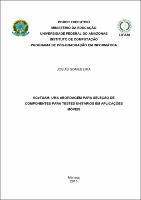| ???jsp.display-item.social.title??? |


|
Please use this identifier to cite or link to this item:
https://tede.ufam.edu.br/handle/tede/6646| ???metadata.dc.type???: | Dissertação |
| Title: | SCoTUAM: uma abordagem para seleção de componentes para testes unitários em Aplicações Móveis |
| Other Titles: | SCoTUAM: an approach for components selecting for unit testing in Mobile Applications |
| ???metadata.dc.creator???: | Lima, Josias Gomes  |
| ???metadata.dc.contributor.advisor1???: | Dias Neto, Arilo Cláudio |
| ???metadata.dc.contributor.referee1???: | Carvalho, José Reginaldo H. |
| ???metadata.dc.contributor.referee2???: | Freitas, Eduardo Noronha Andrade |
| ???metadata.dc.description.resumo???: | O teste de unidade é o nível de teste de software pelo qual partes individuais do código fonte são testadas. A realização deste tipo de teste traz alguns benefícios, tais como redução de falhas em recursos já existentes, melhoram a estrutura do código, diminuem os efeitos colaterais (side effects) e reduzem o medo da alteração do código (Burke e Coyner, 2017). No entanto, a atividade de teste para aplicações móveis tem o tempo reduzido, fazendo com que alguns desenvolvedores optem por não criar os testes de unidade. O tempo reduzido faz com que a automatização dos testes se torne uma necessidade. Nesse contexto, este trabalho propõe um plugin para auxiliar os desenvolvedores na seleção de componentes que tenham um maior valor em relação ao custo x benefício do teste de unidade em aplicações móveis da plataforma Android. Para medir o valor do custo e benefício dos componentes, foram escolhidas as seguintes métricas: halstead effort (HE), custo de manutenção futura (CMF), cheiros de código (CS), frequência de chamadas (FC), risco de falhas (RF), vulnerabilidade de mercado (VM) e valor de negócio VN. O plugin proposto possui três processos principais: (1) Extração de métricas estáticas, (2) Extração de métricas dinâmicas, de mercado e de negócio e (3) Execução do algoritmo genético para seleção dos componentes a serem testados. O plugin chamado SCoTUAM pode ser adicionado à interface de desenvolvimento da IDE Android Studio. Neste trabalho foram realizados dois estudos empíricos para avaliação do plugin proposto. No primeiro estudo, o propósito foi analisar a correlação das métricas, onde o resultado mostrou a possibilidade de usar as métricas CMF, CS, FC, RF, VM e VN combinadas em uma solução multiobjetivo. No segundo estudo, o objetivo foi analisar a eficácia do plugin em selecionar componentes com erro comparado com a seleção manual realizada por especialistas em teste de unidade em aplicações móveis Android, onde o resultado mostrou a viabilidade da proposta em auxiliar o desenvolvedor na seleção de componentes para o teste de unidade. |
| Abstract: | The unit test is the level of software testing by which individual parts of the source code are tested. Implementing this type of test brings some benefits such as reducing failures in existing resources, improving code structure, decrease side effects, and reducing fear of code change (Burke and Coyner, 2017). However, the test activity for mobile applications is time-consuming, causing some developers to choose not to create unit tests. Reduced time makes testing automation a necessity. In this context, this work proposes a plugin to assist developers in selecting components that have a greater value in relation to the cost x benefit of the unit test in mobile applications of the Android platform. To measure the value of cost and benefit of components, the following metrics were chosen: halstead effort (HE), future maintenance cost (FMC), code smells (CS), call frequency (CF), risk of failures (RF), market vulnerability (MV) and business value (BV). The proposed plugin has three main processes: (1) Extraction of static metrics; (2) Extraction of dynamic, market and business metrics; and (3) Execution of the genetic algorithm to select the components to be tested. The proposed plugin called SCoTUAM can be added to the development interface of the Android Studio IDE. In this work two empirical studies were carried out. In the first study, the purpose was to analyze the correlation of the metrics, where the result showed the possibility of using the combined FMC, CS, CF, RF, MV and BV metrics in a multiobjective solution. In the second study, the objective was to analyze the plugin’s effectiveness in selecting components with error compared to the manual selection performed by unit test specialists in Android mobile applications, where the result showed the feasibility of the proposal in assisting the developer in the selection of components for the unit test. |
| Keywords: | Teste de Aplicações Móveis Testes automatizados Teste de unidade Seleção de componentes Mobile testing Automated testing Unit test Components selection |
| ???metadata.dc.subject.cnpq???: | CIÊNCIAS EXATAS E DA TERRA: CIÊNCIA DA COMPUTAÇÃO: METODOLOGIA E TÉCNICAS DA COMPUTAÇÃO: ENGENHARIA DE SOFTWARE |
| Language: | por |
| ???metadata.dc.publisher.country???: | Brasil |
| Publisher: | Universidade Federal do Amazonas |
| ???metadata.dc.publisher.initials???: | UFAM |
| ???metadata.dc.publisher.department???: | Instituto de Computação |
| ???metadata.dc.publisher.program???: | Programa de Pós-graduação em Informática |
| Citation: | LIMA, Josias Gomes. SCoTUAM: uma abordagem para seleção de componentes para testes unitários em Aplicações Móveis. 2018. 100 f. Dissertação (Mestrado em Informática) - Universidade Federal do Amazonas, Manaus, 2018. |
| ???metadata.dc.rights???: | Acesso Aberto |
| ???metadata.dc.rights.uri???: | http://creativecommons.org/licenses/by/4.0/ |
| URI: | https://tede.ufam.edu.br/handle/tede/6646 |
| Issue Date: | 31-Aug-2018 |
| Appears in Collections: | Mestrado em Informática |
Files in This Item:
| File | Description | Size | Format | |
|---|---|---|---|---|
| Dissertação_Josias Lima PPGI | 2.37 MB | Adobe PDF |  Download/Open Preview |
This item is licensed under a Creative Commons License





